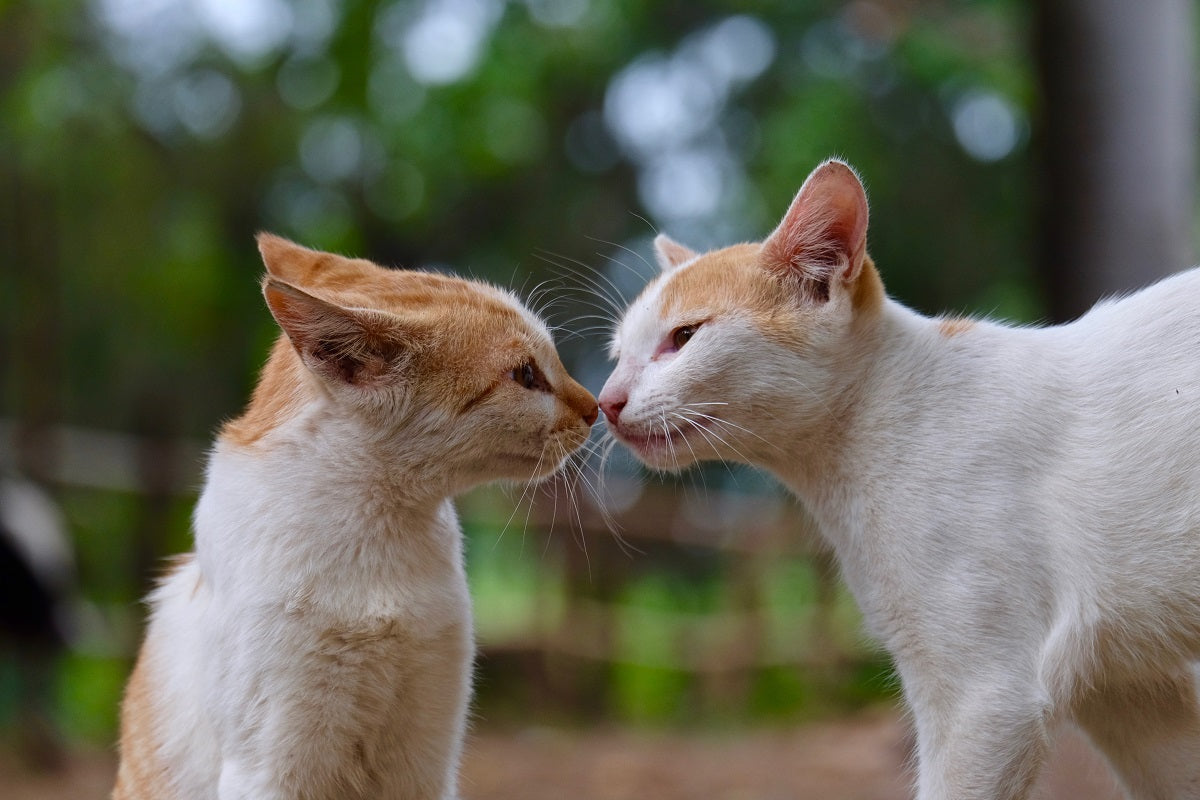March 28, 2024 |6 min read
How to Introduce Cats to Each Other

Written by

Bringing a new cat into your home can be like starting a new chapter full of cuddles, playtime, and adorable meows. However, if you're already sharing your space with a feline friend, you might wonder about the best way to make sure everyone gets along. Here's a friendly guide on how to introduce cats to each other, ensuring a smooth transition for your fluffy family members.
Understanding the Importance of Proper Introduction
Why Proper Introductions Matter
Introducing cats to each other with care is essential for a harmonious home. Cats are naturally territorial, and a new arrival can lead to stress or tension if not handled delicately. A thoughtful introduction process respects their need for space, security, and time to adjust.
Potential Risks of Improper Introductions
When it comes to how to introduce a new cat to your cat, rushing the process can lead to a variety of issues, affecting not only their immediate interactions but also their long-term relationship. Understanding the potential consequences can help you approach the introduction process with the care and attention it deserves. Here are some risks associated with improper introductions:
- Upset Cat: The stress of a rushed introduction can leave cats feeling anxious, scared, or upset. This emotional turmoil can manifest in various ways, from hiding and avoiding interaction to loss of appetite.
- Lasting Animosity: Without the proper time to adjust, cats may develop long-term hostility towards each other. This animosity can lead to ongoing fights, stress, and an uncomfortable living environment for everyone involved.
- Increased Aggression: Improperly introduced cats are more likely to exhibit aggressive behaviors, including hissing, swatting, and biting. Understanding how to stop cats from fighting is important, but preventing aggression from the start is even better.
- Difficulty in Future Introductions: Cats who have had negative experiences with other cats in the past may find it harder to accept new feline companions in the future, making any subsequent introductions more challenging.
By distinguishing cat fighting vs playing, you can better gauge the success of the introduction process and adjust your approach as needed. The goal is to ensure the well-being and happiness of all your feline friends, creating a peaceful and loving home environment.
Cat Litter That Prioritizes Their
Health & Your Happiness.
to get your first bag for only $14.99
Preparing for the Introduction
Creating Separate Spaces for Each Cat
Wondering how to introduce two cats? Start by setting up separate areas for both your resident cat and new cat. This ensures they each have a safe haven, complete with food, water, and a litter box. Cats sharing a litter box might lead to territorial issues, so having separate litter boxes is recommended. It's a good idea to have these spaces ready before the new kitty steps their first paw into your home.
Scent Swapping Techniques
Scent plays a significant role in how cats perceive their environment and each other. Scent swapping involves exchanging blankets or toys between the cats, allowing them to become familiar with each other's scent before meeting face-to-face.
3 Initial Introduction Techniques
#1 Controlled Visual Introduction
A controlled visual introduction might start with allowing the cats to see each other through a door crack. This brief peek can be the first step in building curiosity and tolerance.
#2 Gradual Introduction through Scent and Sound
Before direct contact, let the cats get to know each other through scent and sound. This can be done by feeding them on opposite sides of a door or playing with a cat toy near the door's bottom.
#3 Supervised Physical Introduction in a Neutral Territory
When it's time for a face-to-face meeting, choose a neutral area. Supervised introductions in such a space can help prevent territorial disputes. Keep these meetings short and sweet, gradually increasing the time they spend together.
Observing and Monitoring Behavior
-
Signs of Aggression or Anxiety. Watch for hissing, growling, or swatting as signs of aggression or anxiety. These signals mean it's time to pause and try again later. Understanding and patience are key here.
-
Positive Interaction Cues. Look out for positive signs, like sniffing or playful gestures. These cues suggest that your cats are becoming more comfortable with each other.
-
Post-Introduction Steps and Continued Management. Continuing to monitor their interactions and providing separate resources can help maintain peace. Remember, slow introductions are often the most successful ones.

Proactive Steps with PrettyLitter
Introducing a new cat to your cat, or blending feline families, requires patience, understanding, and a bit of strategy. By proactively preparing for the introduction and paying attention to cat behavioral cues, you're laying the groundwork for a lasting friendship.
At PrettyLitter, we're all about making life with your feline friends as joyful and stress-free as possible. From offering the best in multi-cat litter solutions to providing tips on cat health and happiness, we're here to support you and your kitties every step of the way. Whether you're navigating the introduction process or just looking for ways to enrich your cats' lives, we've got your back.
Sources:
- Anti Cruelty. Introducing a New Cat to Your Other Cats. https://anticruelty.org/pet-library/introducing-new-cat-your-other-cats
- Fear Free Happy Homes. Scents and Scentsability: Feline Senses of Smell and Taste. https://www.fearfreehappyhomes.com/scents-and-scentsability-feline-senses-of-smell-and-taste/
- Humane Society. How to introduce your new cat to resident cats. https://www.humanesociety.org/resources/how-introduce-your-new-cat-resident-cats







